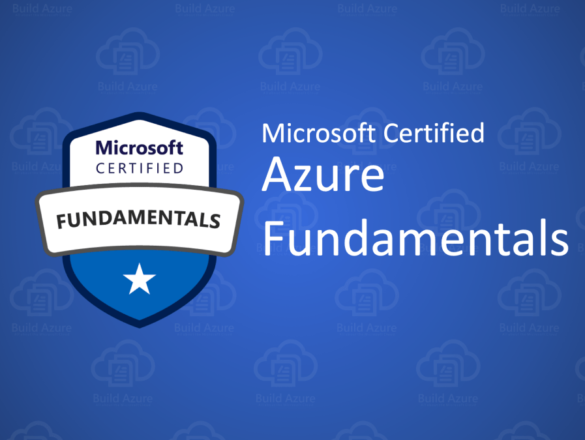With the major hype around the cloud computing market, Microsoft Azure is a key player. You can start your journey in the field of Microsoft Azure by passing the AZ-900 exam and demonstrating your knowledge of this important player in cloud computing.
The AZ-900 exam gauges your knowledge of Microsoft Azure fundamentals and other cloud computing principles. This will help equip them for future success in pursuing a higher-level Azure certification.
Although there are no rigid requirements, it is recommended that you have a foundation in IT and cloud fundamentals. The Azure DevOps certification equips you with the skills to streamline software development processes, enabling efficient collaboration, automation, and delivery in cloud-based environments.
This certification provides an all-inclusive environment, making it appropriate for even people with non-technical backgrounds. Scroll through this informative guide to learn more about the Azure Fundamentals exam.
Basics of AZ-900 Exam
When taking the AZ-900 exam, you will be required to demonstrate your understanding of Microsoft Azure. The AZ-900 exam only tests your fundamental knowledge of the Azure platform. But no candidate without a solid understanding of Azure operations from the grassroot level will be able to pass this exam.
Once you score the required marks and pass the AZ-900 exam, you will be able to obtain other role-based certifications. All these certifications will help you prove your skills and knowledge about Microsoft Azure and related cloud concepts. This certification will also help candidates trying to start their career in Microsoft Azure.
Furthermore, achieving the AZ-900 certification can help you move from Associate to Expert level. With thorough preparation for this Azure certification path, one can acquire practical skills that can be applied to real-life cloud situations.
Syllabus and Format of AZ-900 Exam
The syllabus for the Microsoft AZ-900 exam mainly focuses on foundational concepts of cloud-based services concerning Azure. It includes core Azure services like computing, storage, and networking. This also covers security and privacy services, the Azure support model, and pricing.
You will generally come across 40-60 questions, many of which are in multiple-choice answer format. The duration to complete the Microsoft AZ-900 exam is 1 hour. Candidates need to obtain a minimum of 70% to pass this exam.
Domains of the Microsoft Azure 900 Exam
The different domains included within the Microsoft AZ-900 exam are:
Description of Cloud Concepts
- Understanding different cloud models, including hybrid, private, and cloud, is necessary for passing the exam. With a hybrid cloud model, you will be able to enjoy the benefits of private as well as on-premise cloud systems.
- You must be familiar with different cloud categories like IaaS and PaaS.
- Passing this exam also requires understanding the agility and scalability of Microsoft Azure.
Description of Core Azure Services
- This section will guide you through preparing the fundamental building blocks of the Azure certification path, including regions, availability zones, and more.
- With availability in over 60 regions worldwide, Azure offers a vast selection of services to meet your needs.
- As new regions and data centers are constantly added, Azure provides reliable and scalable solutions to support your business growth.
- Each Azure region comprises multiple data centers, known as availability zones, ensuring maximum availability and performance.
- Furthermore, Azure provides a wide range of computing services, such as App Services, Virtual Machines, Containers, and Kubernetes, to power your applications.
- Azure also offers various storage services, including Blob, Queue, Table, Disk Storage, File Storage, and Database (SQL/NoSQL) storage, such as Azure SQL Server and MySQL Database.
- Azure offers a range of networking services, such as virtual networks and firewalls, that are integral to the platform. These services are often the focus of exam questions. A
- Additionally, Azure boasts a robust catalog of serverless offerings, such as function apps and event grids. They align with cutting-edge technologies like the Internet of Things (IoT) and big data analytics.
- Azure also provides handy tools like PowerShell, Cloud Shell, Azure CLI, and Azure Advisor to streamline resource management.
Description of Privacy, Security, Compliance, and Trust
- In the Azure Fundamentals exam, a strong security foundation is vital for effectively managing network traffic and ensuring the safety of resources. This includes utilizing essential elements such as Network Security Groups (NSG) and Azure Security Center. With these building blocks, you can efficiently organize and secure network activity.
- To further strengthen security, access management for all Azure resources can be easily managed through role-based access control (RBAC) and multi-factor authentication (MFA).
- In addition, Azure’s monitoring capabilities and service health features provide a valuable advantage in identifying and resolving potential issues with your applications, providing proactive solutions within seconds.
- To achieve compliance within your organization, it’s pivotal to possess a solid understanding of Azure services such as Trust Center and data security.
- By familiarizing yourself with these resources, you can effectively work towards meeting your organization’s compliance goals.
Description of Azure Pricing Service Level Agreements and Lifecycles
- In this section of the Azure Fundamentals exam, we will cover various topics related to Azure cost management, including zone-based billing and the Azure Cost Analysis tool.
- With this analysis tool, you can easily track and analyze the costs of your organization’s use of different Azure services.
- Azure also offers pay-as-you-go and reserved instance pricing models, with unique pricing units for each service.
- It is also crucial to familiarize yourself with the services available in the free Azure account, the various options for purchasing Azure products and services, and the service level agreements (SLA).
- Finally, understanding the lifecycle of features, preview features, and monitoring features is essential for optimal usage of Azure.
The number of Microsoft Azure users worldwide is projected to arrive at the 1 billion mark soon, with a 21% market share. Therefore, this is the best time to pass the Azure Fundamentals exam and enjoy lucrative opportunities in the market. So, start preparing for it now. Explore more cloud computing courses.




